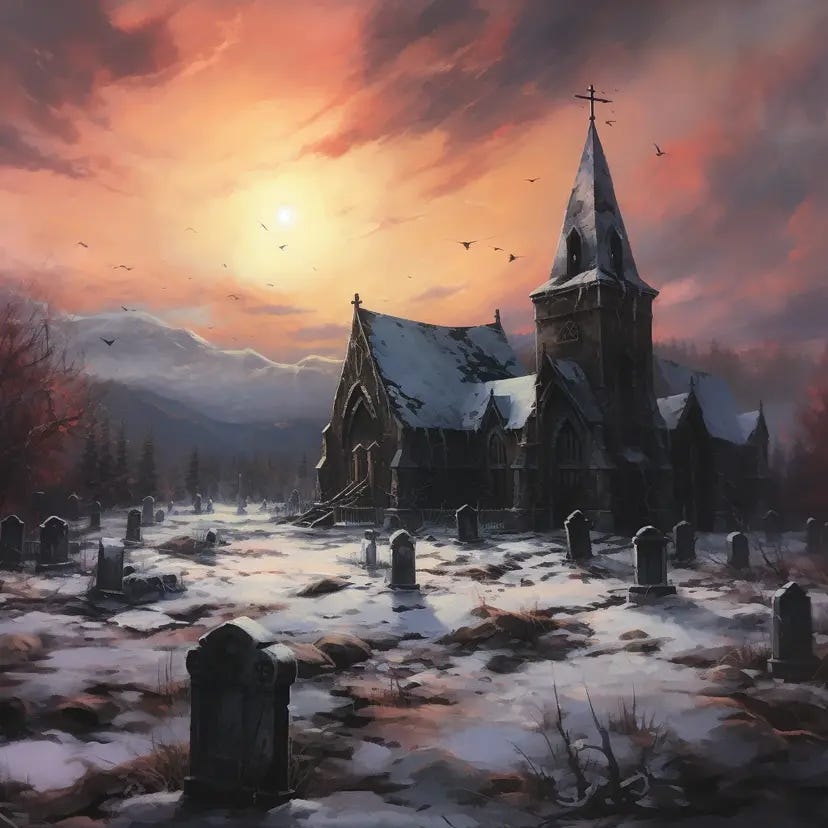Serenity
Flash Fiction written for Iron Age Magazine's "The Calm" prompt
Image pulled from the prompt, which can be found here.
The friar struck cold ground with the spade, breaking it like the many bodies gathered around him. Stiff and uncompromising like the glazed, gothic stones whose icebound forms trickled beneath the warmth not yet stolen of the sun. Even winter could not deprive it of that.
Ravens gathered to mock from the bare branches of trees. Even their black eyes glinted and the friar smiled. He buried and blessed another body, banishing the birds where they massed. There would be no feast, just the calm.
The friar recognized the faces still: millers, farmers, aristocrats, and criminals. Old men and their progeny. Their blood wet the bedrock the village sat upon and life festered there beneath the surface, bound to bloom come spring. Though their faces would no longer show joy in this world, new ones would inherit it. And he would minister to them. He turned from the sun.
These yet were the men he loved and his heart ached to hide their faces in the earth. Perhaps he would not be apart from them long. He pulled his hood tighter as a chill warped his burlap. It groped him and pressed the pustules. None other had survived, a mercy he could not yet grasp.
The raven spoke to him, no light in its eyes. He knelt down to press a former friend gently into the earth. The raven cawed again almost sounding curious. It was calm. He shouted at it and it fluttered away then circled back behind him, glistening feathers bearing a now light snowfall.
The awful loneliness ate away at him and breached again. He was a man among the animals beneath that serene heaven and it made him howl. His cry echoed through and silenced the wild as it rang in the valley. Then he was quiet, and he chased the birds away.
His shadow was amorphous, splayed more like a tombstone than a man across the church’s stone walls. He could move however he wanted, yet its shape was determined by the sun. And now that star was setting and darkness lay on the horizon. Darkness and the last remaining light as it blushed in the west. All the world bathed in blood, the trees creaking in the wind, the birds waiting on the fringes. They clicked and uttered incomprehensible things.
But the job was done, and the friar set his shovel against the side of the church. The ravens leapt down to the fresh graves catching the residual stench produced by winter’s brief warming. But soon they left, and the friar lit a fire in the church. He dared not entertain his real worry.
He would try to gather his thoughts instead, but he found he had never been given a pouch to collect them. As formless as the darkness or the fire he found horror and peace in the same hand and slapped it away. All that remained was the senseless and the raw. He had never prepared for this, never anticipated it, and yet here it lay bare and he could not lose sight of it. He suffered pain enough in the numbness of his limbs, in the boils forming across him, that one afflicting his soul was too much to bear. He lay back, stars visible through the gaps in the ceiling. It was an old church.
Yet there was light in the darkness, discrete points, ancient bones to knit form across distances even ages and leagues apart. These were actors in the play that brought him rest. In the morning they were overcast by the grayness of heaven and he rose to his duties.
Wolves had prowled the murk fringing the fire, but their paws failed them. The friar went over each grave again, fortifying them, then gathered his things. He was allowed another day. He took up his shovel, his map, and took the river road south whereon a hundred more villages lay. He had about him that human calmness: serenity.


